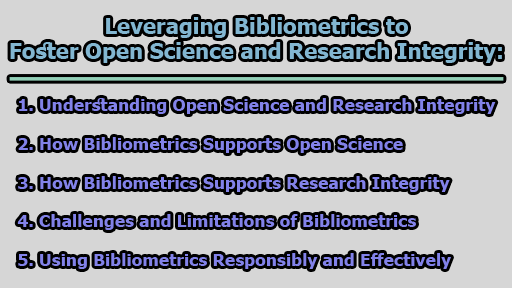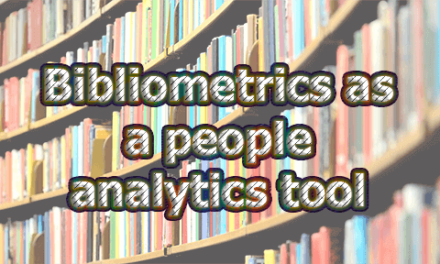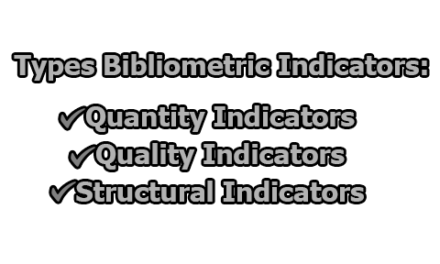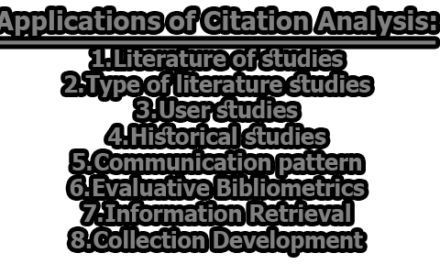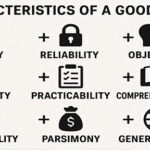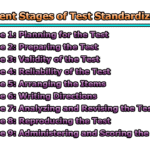Leveraging Bibliometrics to Foster Open Science and Research Integrity:
Open science, with its emphasis on accessibility, transparency, and reproducibility, has emerged as a driving force in modern research. At its core, open science seeks to make research more collaborative, accountable, and inclusive, ultimately boosting its societal impact and relevance. Research integrity, on the other hand, underscores ethical principles and professional standards in research, focusing on honesty, accuracy, and accountability. Bibliometrics, the study of publication and citation patterns, offers a powerful means to support both open science and research integrity. In this article, we will explore leveraging bibliometrics to foster open science and research integrity.
1. Understanding Open Science and Research Integrity: Open science encompasses a broad spectrum of practices, including open access, open data, open peer review, open source, open education, and open innovation. The movement advocates for research outputs and processes that are accessible to all, encouraging collaboration and accountability. Open science seeks to break down the barriers that traditionally hindered the dissemination of research, fostering a more equitable and inclusive research environment.
Research integrity, on the other hand, is the commitment to ethical principles and professional standards throughout the research process. This includes maintaining honesty, accuracy, objectivity, fairness, and accountability from the initial design of research to its final dissemination. Research integrity also involves respect for the rights and interests of research participants, colleagues, funders, and the public, ensuring that the research ecosystem operates with the highest ethical standards.
2. How Bibliometrics Supports Open Science: Bibliometrics can play a significant role in advancing open science by providing metrics and indicators to measure and monitor the openness of research outputs and processes. For instance, bibliometrics can gauge the adoption and impact of open access policies, tracking the number and proportion of publications available online for free. It can also assess the citation advantage of open access articles and the diversity and quality of open access journals and platforms.
Additionally, bibliometrics can help analyze the availability and reuse of research data, the transparency and quality of peer review, interdisciplinary collaboration, and research’s influence on society and policy. By offering quantitative data on these aspects, bibliometrics enhances transparency and helps researchers, institutions, and funders make informed decisions to promote open science.
3. How Bibliometrics Supports Research Integrity: Bibliometrics can contribute to research integrity by offering tools and methods to detect and prevent misconduct in research. It can identify and expose plagiarism, duplication, fabrication, falsification, and manipulation of data and citations. Moreover, bibliometrics can help in spotting predatory publishing and citation gaming, allowing the research community to safeguard the integrity of scholarly work.
Bibliometrics also aids in improving research quality and reliability. It enables the replication, verification, and validation of results, facilitating peer feedback and recognition. By providing quantitative measures of research quality, bibliometrics encourages researchers to strive for integrity and excellence.
4. Challenges and Limitations of Bibliometrics: While bibliometrics offers many advantages, it is not without its challenges and limitations. Data quality and coverage can vary, potentially introducing biases and gaps in representation. Methodological complexities exist, with indicators, algorithms, and models having advantages and disadvantages depending on the research question. Additionally, bibliometric results can inadvertently affect researchers, institutions, funders, and publishers, potentially reinforcing inequalities in the research system.
5. Using Bibliometrics Responsibly and Effectively: To leverage bibliometrics effectively and responsibly, researchers and stakeholders must take a cautious and transparent approach. They should utilize multiple sources, methods, and indicators to capture the full complexity and diversity of research outputs and processes. Careful selection of metrics that align with the analysis’s goals, questions, and criteria is crucial.
Interpreting bibliometric results should be informed by contextual information, and ethical principles must be followed to protect the rights of research stakeholders. Furthermore, transparent and open practices should be employed to share bibliometric data, methods, results, and outputs.
In conclusion, bibliometrics, when used judiciously, offers valuable insights and tools to promote open science and research integrity. By providing quantifiable measures of openness, collaboration, and accountability, bibliometrics contributes to the development of a more transparent and ethical research ecosystem. Researchers, institutions, and funders should be aware of its limitations and use bibliometrics responsibly to ensure that the principles of open science and research integrity are upheld in their work.

Assistant Teacher at Zinzira Pir Mohammad Pilot School and College

